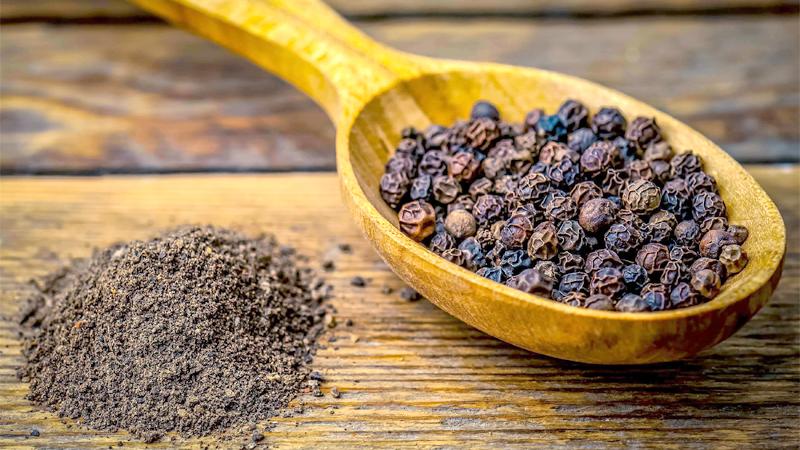
Thousands of pepper farmers who were left powerless by falling prices for their crops had a sigh of relief as they learnt on Friday morning that the government had banned the import of black pepper along with several other minor export crops such as areca nuts, cinnamon, nutmeg, mace, cardamom, ginger, turmeric and cloves for re-export.
According to the Department of Export Agriculture (DEA), some 200,000 pepper farmers, including pepper smallholders in the country, would benefit from this decision.
The Gazette notifications issued under the Commercial Hub Regulations in the Finance Act states that direct re-export and import of spices for re-export purposes after minor processing is prohibited.
Since the Ministry of Finance’s announcement in the Gazette, the pepper farmers have returned with renewed enthusiasm to their crops, the Sunday Observer was told by the DEA District Assistant Directors and other officials in the country’s major pepper-growing districts of Matale, Badulla, Nuwara Eliya, Kurunegala and Kandy.
DEA Assistant Director Badulla District, Sewwandi Wasana Gunewardena said that as a result of the change, the farmers in the Badulla District, who were compelled by the pepper crisis to sell their pepper products at a cost between Rs. 400 and Rs.500 per kilo, sold their products on Friday at a price between Rs. 600 and Rs. 700 per kilo. Many farmers who reportedly withdrew from their pepper-growing enterprises because they were unable to pay their bank loans with their industry’s decreased earnings are now returning to pepper-growing.
Although the survivors of pepper farming have made a major contribution to the national export sector, they have been unable to obtain any attractive farm gate price for their raw products from their urban buyers. The crisis has not come out of nowhere. Neither the quality of the pepper produced by the farmers nor the methods of cultivation followed were bad. The mafia of exporters benefiting from tariff relief under free trade agreements have been operating a pepper re-export racket for the last three years. This compromised poor farmers and the reputation of Sri Lankan pepper on the international market. The demand for Lanka’s pepper has gradually declined on the international market over the last three years due to spice re-exporting rackets in which pepper imported from countries such as Vietnam to Sri Lanka was being re-exported to other countries indicating Sri Lanka as the country of origin by some unscrupulous exporters.
As a result, millions of rupees in tax revenues were lost to the country.
Director General, Department of Export Agriculture, Dr. A.P. Heenkende said at the 35th Annual General Meeting of the Spice and Allied Product Producers’ and Traders Association held in August, “As it was in the last two years, black pepper received high public attention in 2018 creating a significant political tension within the country. Sri Lankan pepper prices showed aslow decline throughout 2018.” He pointed out that, although our export volume of pepper increased by 35.8 per cent that year, the export earnings of pepper decreased by 36.2 per cent, which shows the predicament of the pepper farmers.
Information surfaced in mid June in the year that high quality Sri Lankan pepper was mixed with low quality pepper brought from Balngldesh on board certain ships at sea. The country has lost the demand of the major buyers for its King of Spice because it did not have that pungency or taste characteristic of Sri Lankan pepper, although it was exported under the Sri Lankan label.
Sri Lanka exports its pepper produce to India, Germany, Pakistan, Egypt, USA, UAE, UK, Vietnam, Saudi Arabia and Spain. India buys 65 to 70 percent of these exports.The Hindu reported in January 2018 that bribe in Sri Lanka to re-label Vietnam pepper with a fake certificate of origin cost 1,000 US dollars per metric tonne ; it makes Vietnam pepper eligible to be exported under the Indo-Lanka FTA.
The new government, led by President Gotabaya Rajapaksa, is looking to raise the pepper bar in order to exploit the demand for high-quality pepper in other countries, such as the European market. Ensuring the quality of Sri Lankan spices, which are renowned for their inherent superior pungency, is of paramount importance in moving to high-end international markets.
In the case of pepper, the higher levels of piperine in Lankan cultivated pepper was diluted in the hands of unscrupulous exporters who had damaged the reputation of Sri Lankan pepper. In the case of pepper it was higher piperine levels in Lankan grown pepper that had got diluted in the hands of unscrupulous exporters that had damaged the crop’s reputation. Regulatory regimes must be strengthened to control such instances of corruption. When the office bearers of the previous regime said they had doubled the production of pepper in 2016-2017, it seemed as if they had performed a miracle on the pepper industry. But it was pepper from Vietnam re-exported from Sri Lanka that fashioned it. But now, Finance Minister Mahinda Rajapaksa’s decision to ban the import of small crops to protect farmers and control re-exports has sprouted seeds of fresh hope among farmers to spice up their crops for future harvest.
